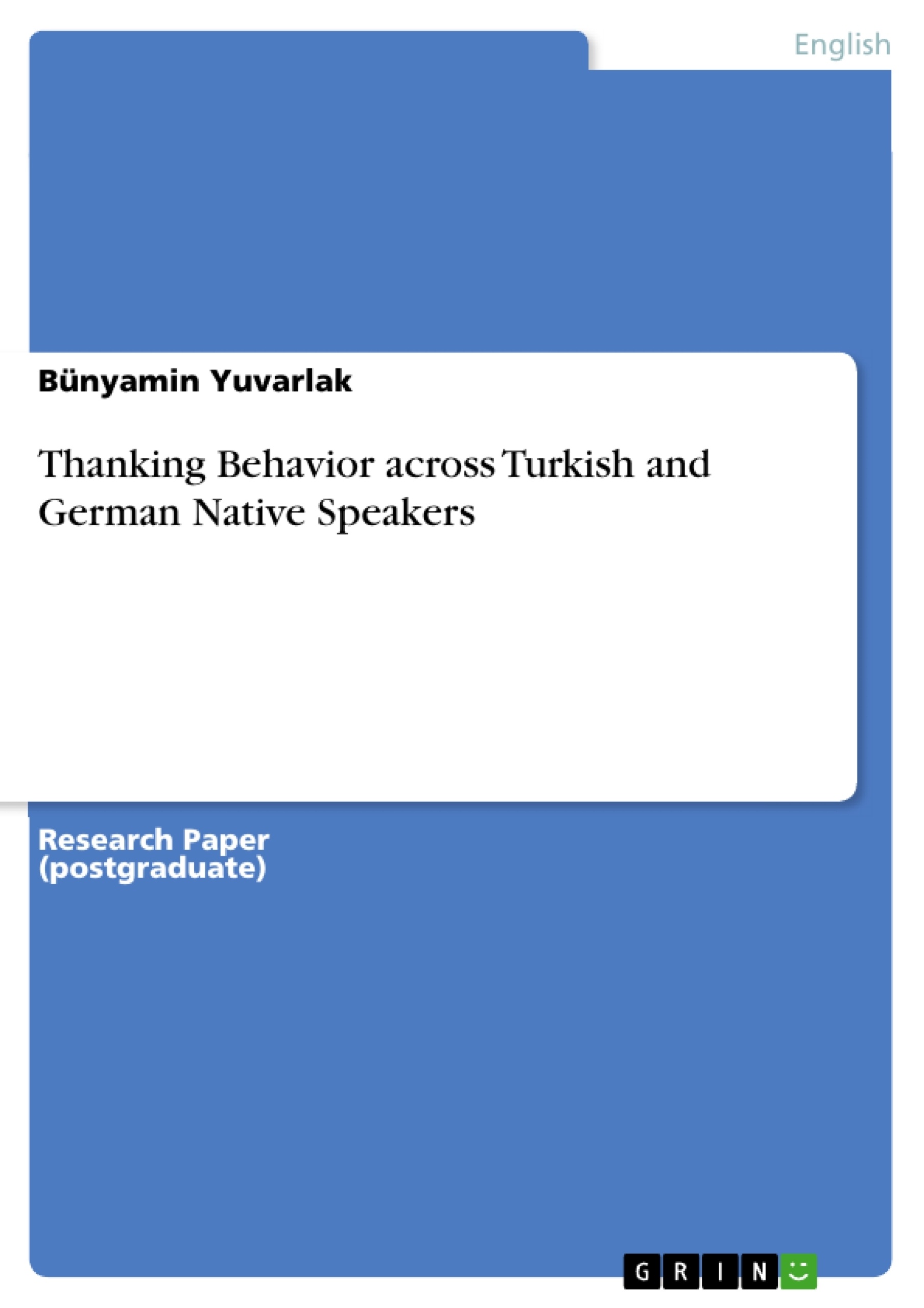The present study compares the thanking behavior across native speakers of Turkish and German and aims to discover similarities or differences based on the form and function of the respective realization strategies. The main focus of the research is to find out if each of the two cultures is oriented towards positive or negative politeness based on an analysis of expressions of thanks functioning as a speech act.
In the past, both the Turkish and the German language have been studied in terms of thanking behavior and politeness orientations, but little to no research has been conducted in comparing the languages in these aspects. It is hoped that the contrastive study at hand provides relevant results regarding differences in thanking behavior and politeness orientations between Turkish and German culture.
Inhaltsverzeichnis (Table of Contents)
- Introduction
- Theoretical background
- Thanking and politeness
- Defining the speech act of thanking
- Positive and negative politeness
- Positive and negative thanking
- Cross-cultural comparison of politeness and speech act of thanking
- Methodology
- Instrument
- Participants and situations
- Results
- Thanking expressions
- Modifying thanks
- Discussion
- Conclusion
Zielsetzung und Themenschwerpunkte (Objectives and Key Themes)
This research examines the differences and similarities in thanking behavior between native Turkish and German speakers. By comparing their expressions of gratitude, the study aims to discover whether each culture prioritizes positive or negative politeness, as outlined in Brown and Levinson's (1987) theory. While prior research has explored thanking behavior in both languages individually, this contrastive analysis provides valuable insights into the cultural variations in politeness orientations.
- Cross-cultural comparison of thanking behavior in Turkish and German
- Analysis of positive and negative politeness strategies in thanking
- Cultural influences on the speech act of thanking
- Understanding the role of politeness in maintaining social harmony
- Investigating the universality of Brown and Levinson's politeness theory across cultures
Zusammenfassung der Kapitel (Chapter Summaries)
- Introduction: The study introduces the concept of thanking as a communicative strategy for maintaining social harmony. It emphasizes the role of politeness in this process and highlights the cultural differences in politeness values. The research aims to compare Turkish and German thanking behavior, focusing on the use of positive and negative politeness strategies.
- Theoretical background: This chapter defines the speech act of thanking and explores the concept of politeness as described by Brown and Levinson (1987). It distinguishes between positive and negative politeness and explains how these strategies relate to facework and the desire for social harmony. The chapter also discusses the universality of Brown and Levinson's theory, examining relevant research on Eastern and Western cultures.
- Methodology: This section outlines the methodology used in the research, including the instrument for data collection and the selection of participants and situations. The rationale behind the chosen methodology is explained, providing clarity on the study's approach.
- Results: This chapter presents the findings of the study, analyzing the thanking expressions and their modifications observed in both Turkish and German native speakers. The analysis focuses on identifying patterns and differences in the use of positive and negative politeness strategies across the two cultures.
Schlüsselwörter (Keywords)
The study focuses on the analysis of thanking behavior, politeness, and cross-cultural communication. Key concepts include positive and negative politeness, facework, cultural variation, and the universality of Brown and Levinson's politeness theory. The research utilizes empirical data collected from Turkish and German native speakers to investigate the cultural differences in thanking expressions and their relationship to politeness strategies.
Frequently Asked Questions
What is the main difference in thanking behavior between Turkish and German speakers?
The study analyzes whether Turkish or German culture is more oriented towards positive or negative politeness when performing the speech act of thanking.
What are "positive" and "negative" politeness?
Positive politeness aims to make the listener feel good and appreciated, while negative politeness focuses on not intruding and respecting the listener's freedom and social distance.
How does culture influence expressions of thanks?
Culture dictates the appropriate level of formality, the choice of words, and whether a thank-you should be modified (e.g., adding a compliment or an apology for the trouble caused).
Whose politeness theory is used in this research?
The study is based on the influential politeness theory of Brown and Levinson (1987), which explores how people maintain "face" in social interactions.
Why is this contrastive study between Turkish and German significant?
While both languages have been studied individually, there is little research comparing them directly, which helps in understanding intercultural communication and avoiding misunderstandings.
- Quote paper
- Bünyamin Yuvarlak (Author), 2018, Thanking Behavior across Turkish and German Native Speakers, Munich, GRIN Verlag, https://www.grin.com/document/998185



